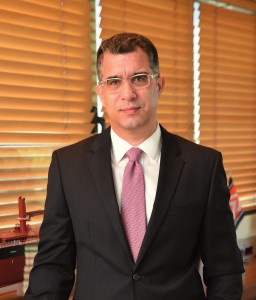Modern technological and scientific achievements have clearly influenced and strengthened shipping as they are utilized for a large part of ship operations. However, this admission does not underestimate the role of the human factor, which remains crucial and necessary.
In this light, Caliber Maritime CEO George Skrimizeas (Γιώργος Σκριμιζέας) says that a ship’s performance can clearly be maximized with the right investments in technology. However, staffing companies and fleets with people who demonstrate dedication and innovative ideas is an equally critical factor for development.
The interview with Mr. Skrimizeas, which follows, focuses on the benefits of different and alternative financing versus traditional lending. At the same time, he explains the catalytic role of technology in the shipping sector, but also expresses his admiration for shipping leaders who are inspired and empowered by their human capital.

Mr. Skrimizeas says: “I entered shipping 35 years ago. Sure, technology was miles behind what it is today in our industry, but it still played, to the extent it could, given the progress of that time, an important role in various aspects of the daily operation of a vessel. Today, investment in technology contributes to improving the performance of ships and the quality of operation of companies through the digitization of business processes and brings significant benefits to all stakeholders.”
On the shipping finance side, Mr. Skrimizeas notes: “We are certainly moving away from traditional ship lending and traditional banks and closer to alternative ship financing with leasing houses taking the lead. Even large financial institutions are now involved in sale and leaseback programs.”
Regarding geopolitical events and how they affect shipping, Mr. George Skrimizeas (Γιώργος Σκριμιζέας) says: “From the closure of the Suez Canal in the late 1960s and the Gulf War in the early 1990s, to the recent tragedy of the war in Ukraine and the COVID 19 pandemic, all of these major events have had a terrible impact on maritime trade, in some cases strengthening the shipping market and in others hurting it. The various business opportunities that have been created from time to time in such circumstances should not be met with negativity, as shipping continues to play the most critical role in the global supply chain and consequently in the well-being of humanity. Regardless of how negative a development may be for the world or part of it, in shipping, for various reasons, opportunities can arise.”
Explaining his company’s chartering policy, Mr. Skrimizeas (Γιώργος Σκριμιζέας) says: “We enter into long-term contracts with our charterers and have built the foundation for cooperation with mutual understanding and concessions. In this way, we minimize counterparty risk and largely avoid operational conflicts, while maintaining the ability to agree favorable terms and take advantage of the market recovery.”
Mr. Skrimizeas’ view on maritime education is as follows: “The standards for the education, safety and well-being of seafarers 35 years ago were nowhere near what they are today. Fortunately, we have come a long way in terms of technological advancement, which has created the need for increased crew training in such developments. In addition, safety awareness has been raised significantly and safety regulations and practices are now widely enforced beyond each company’s internal safety procedures, which ensure the safety of seafarers. However, particular attention should be paid to the well-being of seafarers on ships, an issue that was raised quite a bit during the pandemic, and is a key factor in attracting and retaining competent crews.”
In conclusion, Mr. Skrimizeas (Γιώργος Σκριμιζέας) also comments on the ideal leadership model: “It is difficult to identify a specific name. I have always been inspired by those leaders in our industry who have invested in people, both on board and ashore, and have drawn strength from their people to grow their fleet and their companies.”
